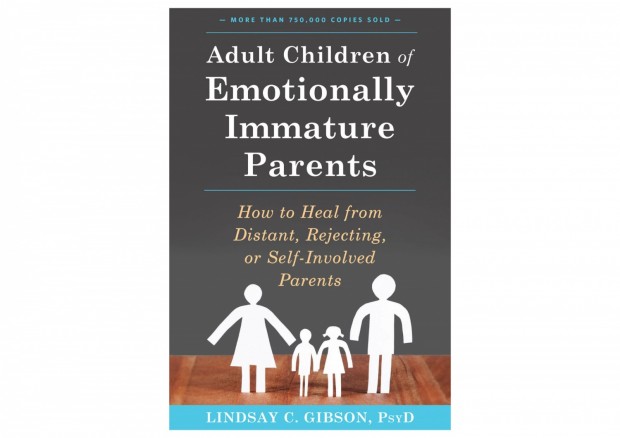Therapist Lindsay Gibson's 2015 Book on Emotionally Immature Parents Surges in Sales, Gains Social Media Attention

Discover the phenomenon behind therapist Lindsay Gibson's 2015 bestseller, "Adult Children of Emotionally Immature Parents," now making waves on social media and Amazon.(Photo : Amazon/Lindsay Gibson)
In 2015, Lindsay Gibson wrote "Adult Children of Emotionally Immature Parents." Recently, it has become popular on social media and became a bestseller on Amazon. Gibson suggests that sometimes children are more emotionally mature than their parents, causing conflicts between them.
Understanding Emotionally Immature Parents
A set of emotionally immature parental behaviors may include avoiding emotions or an inability to be vulnerable, as well as dismissing other people's emotions. These habits might shape their children's emotional processing and relationships in adulthood. Gibson categorizes emotionally immature parents into four types: driven, passive, rejecting, and emotional.
Speaking to the Fatherly podcast, Gibson defined immature emotional people as those who cannot manage their emotions, lack self-reflection, and avoid deep emotional intimacy. If one tries to discuss with emotionally unstable parents, it is as if they are drowning in a whirlpool of defense mechanisms or perplexity. While good communication abilities help a lot, it is hard to make progress when another person refuses to comprehend.
As Gibson stated, communication involves the ability to grasp the other party's point of view entirely, which is made possible when they are willing to listen. Hence, emotional maturity is crucial to developing a harmonious relationship.
A Balanced Approach to Understanding Emotional Complexity
Gibson's book resonates with many because she avoids using extreme terms like 'narcissism' and 'toxic' too frequently, recognizing that some parents may have redeeming qualities despite their emotionally immature behavior. She acknowledges that some parents may exhibit destructive or sadistic behavior, warranting estrangement for self-protection.
READ ALSO: Dr. Nicole Saphier Shares Journey and Stories of Motherhood in Upcoming Book 'Love, Mom'
Many readers grapple with the complexities of their relationships, especially when their parents have made significant sacrifices or shown occasional support. "Adult Children" fills in these gray areas by acknowledging that parents can be both supportive and damaging, offering guidance on setting boundaries for those seeking to navigate complex family dynamics without severing ties entirely.
The book's impact is not confined to its pages but also infiltrates social media channels where readers spill out real-life passages and personal thoughts. Modern vocabulary contains words similar to 'emotionally immature parent,' which are regularly used by the general public in making sense of and dealing with family-related matters.
The book's popularity reflects society's increasing interest in understanding family psychological dynamics. However, it also raises questions about whether labeling parents as 'emotionally immature' overlooks cultural and generational differences in emotional expression and upbringing. While the book provides valuable understanding, it is crucial to consider broader perspectives and refrain from oversimplifying intricate relationships.
Parenting dialogues have progressed notably in recent years, introducing concepts like 'helicopter parent' and 'responsibilized parent' into common parlance. The emphasis on psychological aspects of parenting may occasionally set unrealistic standards and oversimplify multifaceted dynamics. Additionally, societal changes, such as increased parental involvement and the rise of parenting apps, have influenced parenting practices and perceptions.
Gibson's book is not just a theoretical exploration of emotionally immature parenting; it offers practical guidance on navigating these complex relationships. It underscores the importance of setting boundaries, understanding the origins of parental behavior, and prioritizing self-care.
While no parent is perfect, the book encourages acknowledging mistakes and maintaining open communication to foster healthier parent-child relationships.
RELATED ARTICLE: The Rise of Self-Help Literature in the TikTok Era: How Keila Shaheen is Revolutionizing Mental Health
© 2023 Books & Review All rights reserved.
Popular Now
1
Books to Read After 'Fourth Wing': Top Picks for Fantasy and Romantasy Fans

2
‘The Secret Public’ by Jon Savage Book Review: An Insightful Look Into the LGBTQ Influence

3
Stephanie Regalado's 'If They Only Knew' Column Is Now A Book, Unleashing 60 Anonymous True Stories to Empower Women

4
'No Wire Hangers' Scene That Almost Did Not Happen: New Book Reveals Faye Dunaway's Struggles

5
Rare First Edition of Aphra Behn's Novel 'Oroonoko' Discovered in Kent: A Historic Literary Find

Latest Stories
Book Reviews
‘The Secret Public’ by Jon Savage Book Review: An Insightful Look Into the LGBTQ Influence

Book News
Stephanie Regalado's 'If They Only Knew' Column Is Now A Book, Unleashing 60 Anonymous True Stories to Empower Women

Book News
'No Wire Hangers' Scene That Almost Did Not Happen: New Book Reveals Faye Dunaway's Struggles

Book Reviews
‘The Perfect Couple’ by Elin Hilderbrand Book Review: A Captivating Summer Mystery

Book News
New Book ‘The Franchise’ Reveals Penguins President Kyle Dubas’ ‘Biggest Mistake’ as Maple Leafs GM











